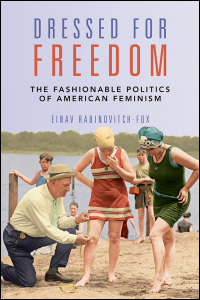New book – DRESSED FOR FREEDOM: THE FASHIONABLE POLITICS OF AMERICAN FEMINISM by Einav Rabinovitch-Fox
how to join
Resources
about ccwh
We help women historians thrive through events, resources, and community.
 Dressed for Freedom: The Fashionable Politics of American Feminism, a new book written by Einav Rabinovitch-Fox (The CCWH’s own Membership Outreach Committee Chair) is releasing on November 16, 2021. Congratulations to Einav!
Dressed for Freedom: The Fashionable Politics of American Feminism, a new book written by Einav Rabinovitch-Fox (The CCWH’s own Membership Outreach Committee Chair) is releasing on November 16, 2021. Congratulations to Einav!
Description:
Often condemned as a form of oppression, fashion could and did allow women to express modern gender identities and promote feminist ideas. Einav Rabinovitch-Fox examines how clothes empowered women, and particularly women barred from positions of influence due to race or class. Moving from 1890s shirtwaists through the miniskirts and unisex styles of the 1970s, Rabinovitch-Fox shows how the rise of mass media culture made fashion a vehicle for women to assert claims over their bodies, femininity, and social roles. She also highlights how trends in women’s sartorial practices expressed ideas of independence and equality. As women employed new clothing styles, they expanded feminist activism beyond formal organizations and movements and reclaimed fashion as a realm of pleasure, power, and feminist consciousness.
A fascinating account of clothing as an everyday feminist practice, Dressed for Freedom brings fashion into discussions of American feminism during the long twentieth century.
Accolades:
Fashion and feminism may seem antithetical, but Einav Rabinovitch-Fox cogently argues that they are closely intertwined. Her stimulating book highlights how Gibson girls, flappers, women designers, and even 1960s feminists saw modern clothes as an integral part of women’s freedom.–Kathy Peiss, author of Hope in a Jar: The Making of America’s Beauty Culture
Dressed for Freedom is an innovative exploration of the ever-shifting and complex relationship between feminists and fashion. Einav Rabinovitch-Fox shows how women as activists, designers, and consumers translated feminist ideas into everyday practices and turned shirtwaists and sportswear into the material through which women asserted identities and claimed rights to freedom of movement.–Maxine Leeds Craig, author of Sorry I Don’t Dance: Why Men Refuse to Move
Einav Rabinovitch-Fox teaches history at Case Western Reserve University. This research was funded, in part, under the auspices of the Baker-Nord Center for the Humanities, Case Western Reserve University.
September 22, 2021
how to join
Resources
about ccwh
We help women historians thrive through events, resources, and community.
Copyright © 2022 Coordinating Council for Women in History. All Rights Reserved.
Privacy Policy | Terms of Use | site credit